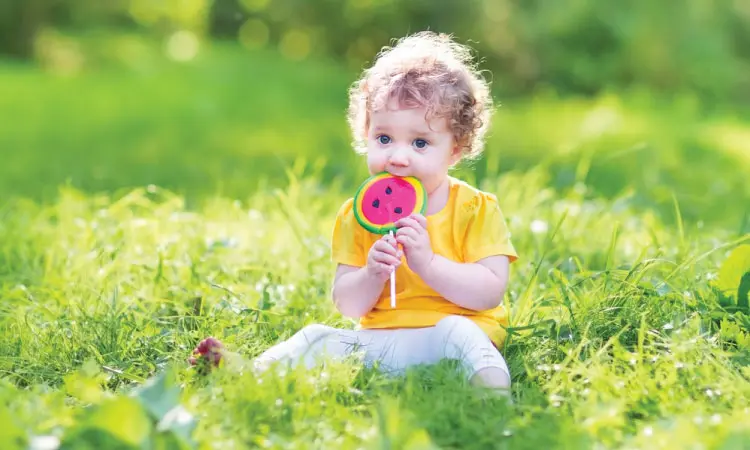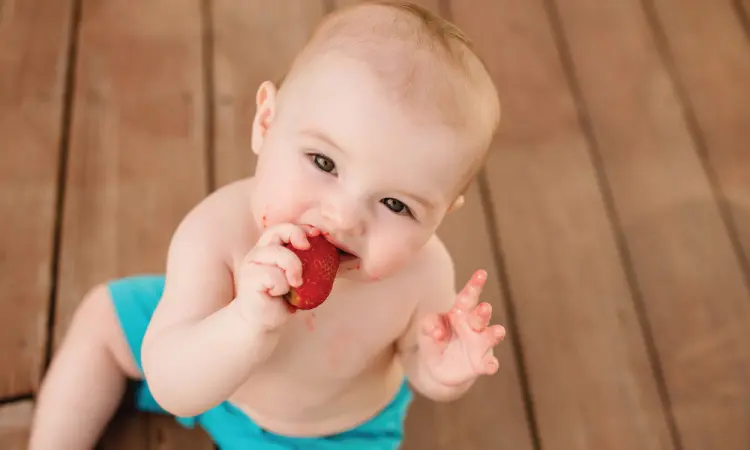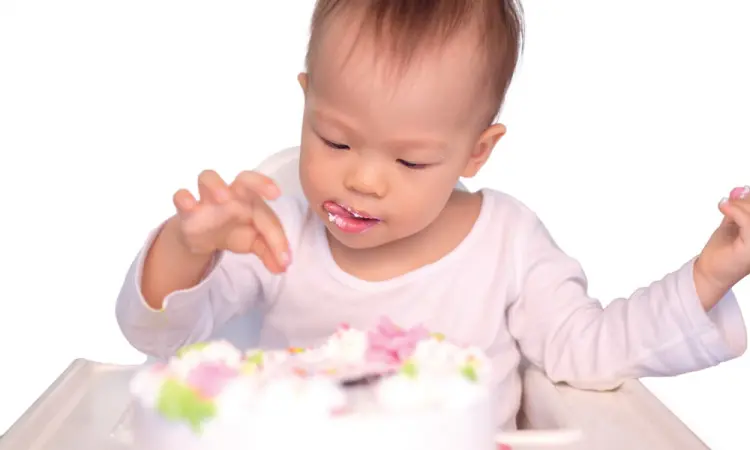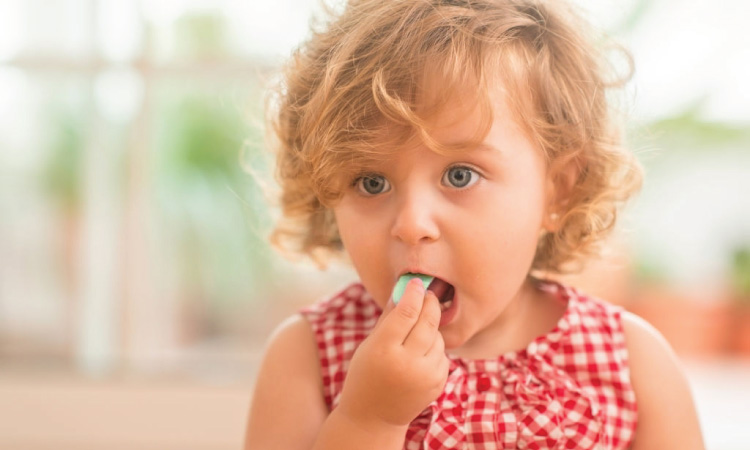Solid foods are generally introduced to babies once they are 6 months old. One of the first things parents must do before introducing them to solid foods is to make sure they are capable of sitting on high chairs and have good control over their heads and neck. While a lot of parents gather all the information on healthy foods for their kids, it is also important to be aware of foods that are unsafe for babies.
What Makes Certain Foods Unsafe For Babies?
Some, otherwise innocuous food can be dangerous for babies for so many reasons, like:
- Babies’ digestive system is not mature enough to digest certain food
- Some foods pose the risk of food allergy
- Some foods pose choking hazards for babies
- Some foods can cause digestive issues like gas formation, constipation, etc.
15 Common Foods That Can Be Unsafe For Babies
It is advisable that you avoid feeding your baby certain foods before they are twelve months of age, if not older. This is due to the fact that certain foods may pose a risk to the baby’s health – this may be as a result of allergies, choking hazards, and so on, and may even require a trip to the hospital if the case is too severe. It is, therefore, necessary that one knows the top dangerous foods for a baby.
Here are the top 15 unsafe foods to avoid feeding your baby:
1. Whole nuts
Children, especially those under five years of age must avoid consuming whole nuts as they pose a high risk of a choking hazard. However, nuts can be a very good source of nutrients and so it is still recommended to consume them, albeit in a powdered form. They may also be soaked and blended and added to your baby’s food. However, be aware of allergies and consult a physician if necessary.
Related Reading: 12 Best Foods For Baby Brain Development
2. Sugar
It is important that you delay introducing sugars to your baby’s diet as they can greatly disrupt their appetite, and even turn them away from breast milk due to preference of taste. It is also no secret that sugar is really unhealthy and in extreme cases, can also lead to obesity. It is therefore recommended that you wait till your child turns one, and introduce them to naturally sweet foods like honey before gradually introducing sugars to their diet.
3. Sticky foods

A lot of the foods available to a baby, especially those that are store-bought may be sticky and hard to swallow. This can pose quite a serious health hazard as sticky foods may result in choking if the baby is not able to swallow them properly, especially if they are only just learning how to chew their food and find it difficult to chew properly.
Related Reading: 10 Indian Baby First Foods 4-6 Months
4. Honey
Though honey is natural and can be healthy in moderate amounts, there is a chance that it may contain bacteria known as Clostridium Botulinum. These bacteria can produce a toxin that causes lethargy and constipation along with muscle weakening in babies. This is quite rare but tends to affect children under 12 months of age.
5. Chocolates and candies
It goes without saying that chocolates and candies are among the most unhealthy foods one can possibly consume due to their high sugar content. This applies all the more to your baby, and are among the most dangerous foods for toddlers as well
In addition to this, your baby may find it difficult to digest chocolates as well. There is also the very serious possibility of a choking hazard, especially with big, sticky chocolates, lollipops, and so on.
6. Cow’s milk
The high lactose content in cow’s milk can have a bad effect on your baby’s tummy and therefore it is better to avoid it until they turn one. Till then, breastmilk is without a doubt, the best choice for your baby. Afterward, however, it may be better to use cow’s milk as it is easier to digest and is rich in nutrients needed to help your baby grow.
7. Tea and coffee
Tea and coffee can be very unhealthy for your baby, as the tannin in tea can prevent them from properly absorbing necessary iron and too much caffeine from coffee may go so far as to cause serious damage to the baby’s nervous system. In addition to this, they may also experience headaches, an upset stomach, and even be sleep deprivation. So refuse to let them have a sip even if they insist.
8. Berries and citrus fruits

It is undoubtedly important for your child to consume a healthy amount of fruits and vegetables. However, certain berries and citrus fruits like strawberries, blackberries, raspberries, oranges, limes, and so on contain high amounts of acid and vitamin C that can upset your baby’s stomach and even cause rashes. It is also worth noting that your child may be allergic to them as well, so extra caution is advised. It is better to wait a year before introducing these foods to their diet, and perhaps even to juice and dilute them before consumption.
Related Reading: How To Use Orange Juice For Baby Constipation (10 Months & Above)
9. Raisins and other fruits and vegetables that pose choking hazards
Peas, pomegranate seeds, raisins, and perhaps most of all, grapes can be serious choking hazards for your child, especially before they are able to chew properly. It is therefore recommended that you avoid these entirely till your child is at least an year old, and still remain cautious afterward.
10. Chips
Processed foods, especially those deep-fried like chips have a high salt content. Babies should ideally consume salt as little as just shy of 1g per day. Exceeding this will easily make them feel full faster, and therefore leaves little room for more nutritious foods.
Related Reading: When And How To Give Dalia To Babies?
And don’t worry, babes do not need salt because they do know it exists.
11. Seafood and shellfish and fish high in mercury
Most shellfish like lobsters and shrimps are very common allergens, and certain fish like sharks, mackerel, and tuna contain unhealthy levels of mercury. It is advised that you try and avoid these fish entirely while till your child is 1-2 years old.
It is better to start your child off with fish like cod or flounder. Be sure to consult a pediatrician as required.
12. Popular mithais

Most common sweetmeats like jalebis, gulabjammuns, and so on are high in sugar, sugar syrup and fat, and have a high caloric count. These foods tend to fill your baby’s tummy quickly, leaving little room for healthier foods, and can be very unhealthy for your baby. They must therefore be avoided entirely till they are at least a year of age.
Related Reading: 7 Signs You Are Overfeeding Your Baby (0-1 Years)
13. Fast foods
Most common fast foods are high in saturated fats, salt, and sugar, and so it is generally better to avoid them or at least, greatly moderate their intake. For babies, however, besides the obvious issues with sugar and salt, and the risk of obesity, these foods are also difficult to digest and chew, and may even lead to choking. Fast foods like burgers, pizza, chaats, samosas, and so on must be avoided at all costs from a baby’s diet.
14. Canned fruit juices
While fruit juices, in general, are healthy and delicious, canned fruit juices are a different story. As they are rich in preservatives, they can be really unhealthy for a baby and lack proper nutrients. It would be better to eat regular fruit or drink natural fruit juices.
However, as juices can be high in concentrated sugars, and lacking in fiber, regular fruit seems the healthier alternative. It would be good to consult a pediatrician regarding this before giving juices to your baby.
15. Partially cooked eggs
Eggs must be avoided entirely until your baby is at least 6 months of age, after which the yolk may be given, but only if it is hard-boiled or fully cooked. This is because eggs can lead to a lot of issues in babies, such as stomachaches, breathing problems, rashes, and itching.
16. Baby snacks and food pouches

Packaged foods can contain unhealthy amounts of sugar and salt that are not good for your baby. Salt and sugar that are used to enhance the taste of the baby foods are neither nutritious nor necessary for the baby.
Babies, who get used to the sweet and salty taste of packaged food will eventually lose interest in subtle flavors of homemade food. The same drawback applies to pureed baby food that comes in easy-to-eat pouches as well.
Sometimes, you occasionally may have to rely on baby snacks and food pouches. On those occasions, it is important that you look at the listed ingredients of a particular baby snack and food pouches and making sure it is not harmful before feeding it to your baby.
However, the better alternative would always be to stick to homemade foods that are rich in essential nutrients for your baby, and low in harmful sugar, salt, and fat even if this is the less convenient option. Homemade food can also diversify your baby’s diet, as opposed to packaged foods that would simply make them picky eaters.
Conclusion
Most of the foods available to your baby can cause health problems or choking hazards. It is important that you do not introduce too much solid food to your child’s diet until they have mastered chewing. Until then, it is better to feed them breastmilk with mashed foods, or carefully chosen solid foods that wouldn’t be difficult to chew.


1 comment
What about peeled whole bannas ?